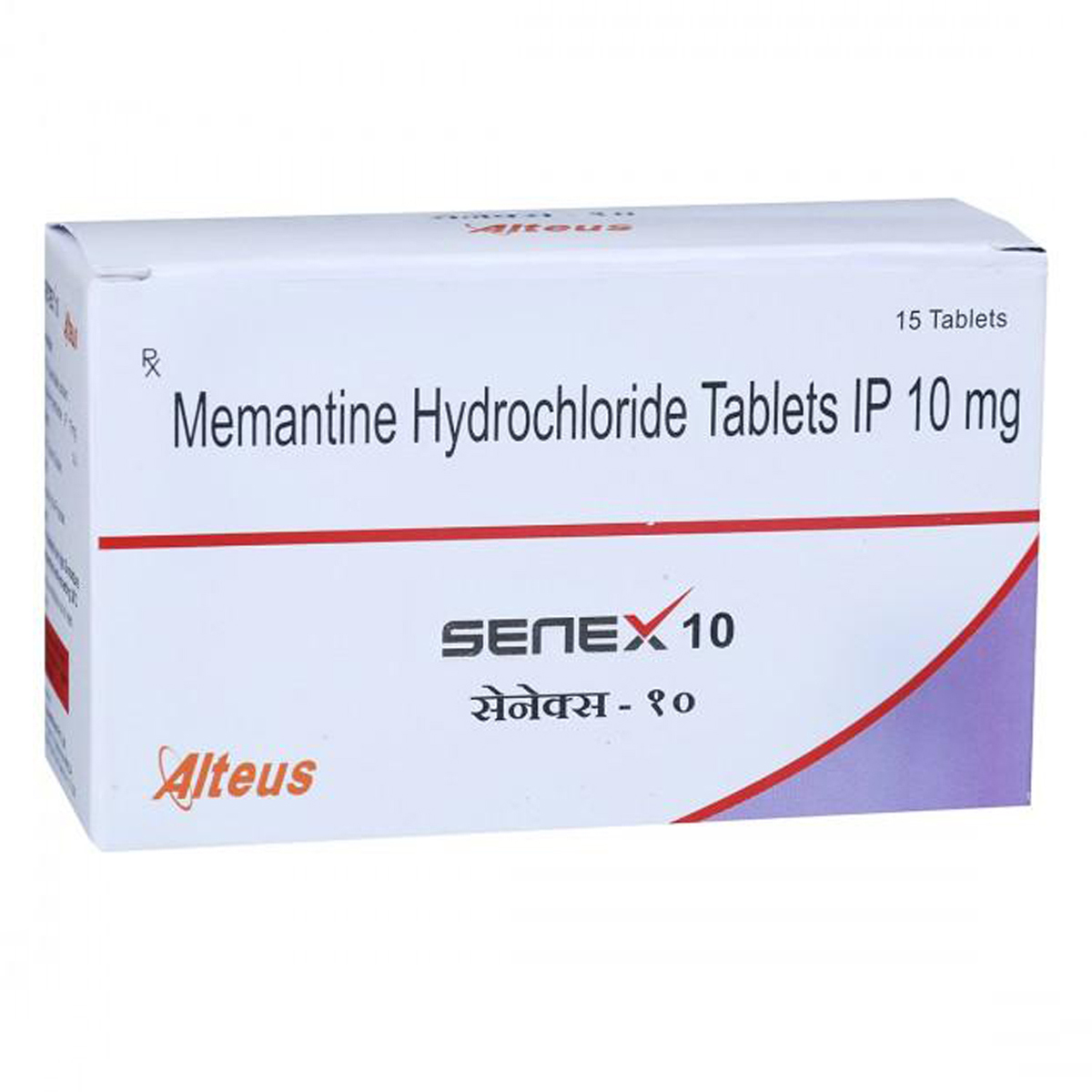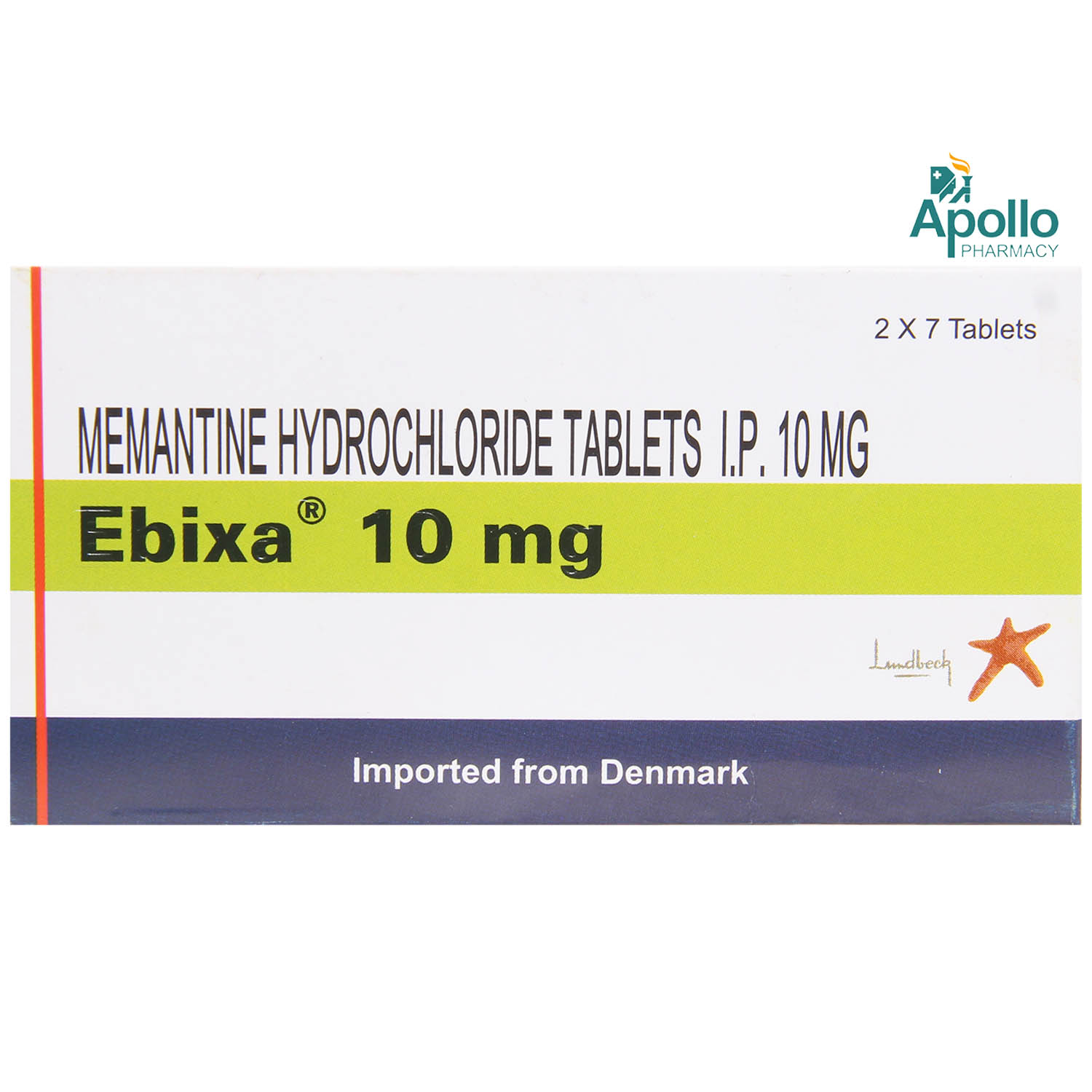Memary Tablet

MRP ₹80
(Inclusive of all Taxes)
₹12.0 Cashback (15%)
know your delivery time
Provide Delivery Location
Composition :
Manufacturer/Marketer :
Consume Type :
Expires on or after :
Return Policy :

Secure Payment

Trusted by 8 Crore Indians

Genuine Products
Therapeutic Class
Country of origin
Manufacturer/Marketer address
Author Details
We provide you with authentic, trustworthy and relevant information
FAQs
Memary Tablet acts on the N-methyl-D-aspartate (NMDA) receptors involved in the transmission of nerve signals which play an important role in learning and memory. Memary Tablet decreases the brain's abnormal activity and may improve the ability to think and remember or might slow the loss of these abilities in people with Alzheimer's disease.
Memary Tablet is used to treat dementia associated with Alzheimer's disease. Dementia (memory loss) is the loss of cognitive functioning, such as remembering, thinking, and reasoning.
Memary Tablet does not cure Alzheimer's disease. Memary Tablet improves the ability to think and remember or slow the loss of these abilities in people with Alzheimer's disease. Research is still in progress for the cure of Alzheimer's disease.
Do not discontinue Memary Tablet without consulting your doctor. To treat your condition effectually continue taking Memary Tablet for as long as prescribed. Do not be reluctant to speak with your doctor if you feel any difficulty while taking Memary Tablet .
Diarrhoea could be a side-effect of Memary Tablet . Drink plenty of fluids and eat fibre rich food if you experience diarrhoea. Consult your doctor if you experience excessive diarrhoea or if you find blood in stools.
Memary Tablet may cause high blood pressure. Regular monitoring of blood pressure levels is advised while taking Memary Tablet . Consult your doctor if you experience any fluctuations.
Disclaimer
Alcohol
Safe if prescribed
Avoid consumption of alcohol while taking Memary Tablet as it may cause increased dizziness.
Pregnancy
Consult your doctor
Memary Tablet belongs to pregnancy category B. Caution should be exercised; it is advisable to consult a doctor before using Memary Tablet .
Breast Feeding
Consult your doctor
It is not recommended to breastfeed while taking Memary Tablet . Consult your doctor before taking Memary Tablet if you are breastfeeding.
Driving
Safe if prescribed
Memary Tablet causes dizziness, sleepiness and might change your reactivity. Do not drive or operate machinery.
Liver
Consult your doctor
Memary Tablet should be used with caution in patients with severe hepatic impairment. Please consult your doctor if you have a liver impairment or any concerns regarding this.
Kidney
Consult your doctor
Dose adjustment may be needed in patients with severe kidney impairment. Please consult your doctor if you have kidney impairment or any concerns regarding this.
Children
Safe if prescribed
Memary Tablet is not recommended for children below 18years as the safety and effectiveness have not been established.
Product Substitutes
About Memary Tablet
Memary Tablet belongs to a group of medicines called anti-dementia agents used to treat moderate to severe Alzheimer's disease. Alzheimer's disease is a neurological disorder that causes dementia (memory loss), and slowly destroys the ability to think, learn, communicate, and handling daily activities.
Memary Tablet contains 'Memantine' which is an NMDA receptor antagonist. It acts on the N-methyl-D-aspartate (NMDA) receptors involved in transmitting nerve signals that play an essential role in memory. Memary Tablet decreases the brain's abnormal activity and may improve the ability to think and remember or might slow the loss of these abilities in people with Alzheimer's disease.
Take Memary Tablet with or without food. You are advised to take Memary Tablet for as long as your doctor has prescribed it for you depending on your medical condition. In some cases, you may experience certain common side-effects such as headache, sleepiness, dizziness, diarrhoea, constipation, balance disorders, and high blood pressure. You are advised to talk to your doctor if you experience any of these side-effects persistently.
Please do not stop taking Memary Tablet without consulting your doctor. Consult your doctor before taking Memary Tablet if you are pregnant or breastfeeding. Avoid driving or operating machinery as Memary Tablet causes dizziness, sleepiness, and may affect reactivity. Avoid consuming alcohol along with Memary Tablet as it could lead to increased dizziness. Memary Tablet is not recommended for children below 18years as the safety and effectiveness have not been established. Keep your doctor informed about your health condition and medicines to rule out any side-effects.
Uses of Memary Tablet
Medicinal Benefits Mweb
Key Benefits
Memary Tablet belongs to a group of anti-dementia agents called NMDA receptor antagonist. Memary Tablet is used to treat moderate to severe dementia (memory loss) of Alzheimer's disease. Memary Tablet acts on the N-methyl-D-aspartate (NMDA) receptors involved in transmitting nerve signals which play an important role in memory. Memary Tablet works by decreasing the brain's abnormal activity and may improve the ability to think and remember or might slow the loss of these abilities in people with Alzheimer's disease.
Directions for Use
Side Effects of Memary Tablet
- Headache
- Sleepiness
- Dizziness
- Confusion
- Diarrhea
- Constipation
- Balance disorders
- High blood pressure
- Shortness of breath
- Elevated liver function tests
Drug Warnings
Do not take Memary Tablet if you are allergic to any of its contents. Inform your doctor if you have/had epilepsy (fits), heart attack, congestive heart failure, or uncontrolled high blood pressure. Talk to your doctor if you change your diet from normal to strict vegetarian or if you are having any kidney problems or urinary tract infections. Avoid taking amantadine (used to treat Parkinson's disease), ketamine (anesthetic), dextromethorphan (used to treat cough), and other NMDA-antagonists at the same time. Consult your doctor before taking Memary Tablet if you are pregnant or breastfeeding. Avoid driving or operating machinery as Memary Tablet causes dizziness, sleepiness, and may affect reactivity. Avoid consuming alcohol along with Memary Tablet as it could lead to increased dizziness. Memary Tablet is not recommended for children below 18years as the safety and effectiveness have not been established.
Drug-Drug Interactions
Drug-Drug Interactions
Login/Sign Up
Drug-Food Interactions
Drug-Food Interactions
Login/Sign Up
Drug-Diseases Interactions
Drug-Diseases Interactions
Login/Sign Up
Drug-Drug Interactions Checker List
- AMANTADINE
- DEXTROMETHORPHAN
- BACLOFEN
- CIMETIDINE
- RANITIDINE
- PROCAINAMIDE
- QUINIDINE
- QUININE
- NICOTINE
- HYDROCHLOROTHIAZIDE
- LEVODOPA
- BROMOCRIPTINE
- QUETIAPINE
- DANTROLENE
- KETAMINE
Habit Forming
Special Advise
- Regularly monitor blood pressure levels while taking Memary Tablet as it may cause high blood pressure.
Diet & Lifestyle Advise
- Maintain proper weight by following a healthy diet.
- Exercise regularly as it helps in less cognitive decline and brain volume loss.
- Avoid smoking and alcohol consumption.
- Try to avoid stress by practicing meditation or yoga.
- Include fruits and vegetables in your diet as they contain anti-oxidants.
- Eat nutritious food as it helps in cognitive stimulation.
- Limit foods with high cholesterol and saturated fats.
- Cut down on sugar, salt, and processed foods.
- Drink plenty of water.
- Follow a healthy lifestyle as it helps in improving overall health and possibly protects the brain.
All Substitutes & Brand Comparisons
RX
Meminzer-10 mg Tablet 10's
Tripada Healthcare Pvt Ltd
₹92.5
(₹8.33 per unit)
15% COSTLIERRX
Out of StockDmentin 10mg Tablet MD
Micro Labs Ltd
₹95
(₹8.55 per unit)
18% COSTLIERRX
Out of StockAdmitine 10mg Tablet
₹125
(₹11.25 per unit)
56% COSTLIER

Have a query?
Buy best C.n.s Drugs products by
Intas Pharmaceuticals Ltd
Sun Pharmaceutical Industries Ltd
Torrent Pharmaceuticals Ltd
Alkem Laboratories Ltd
Abbott India Ltd
Cipla Ltd
Alteus Biogenics Pvt Ltd
Micro Labs Ltd
Lupin Ltd
Ipca Laboratories Ltd
D D Pharmaceuticals Pvt Ltd
Icon Life Sciences
Mankind Pharma Pvt Ltd
Tripada Healthcare Pvt Ltd
Arinna Lifesciences Ltd
Linux Laboratories Pvt Ltd
East West Pharma India Pvt Ltd
La Renon Healthcare Pvt Ltd
Talent India Pvt Ltd
Tas Med India Pvt Ltd
Zydus Healthcare Ltd
Cnx Health Care Pvt Ltd
Eris Life Sciences Ltd
Leeford Healthcare Ltd
Emcure Pharmaceuticals Ltd
Macleods Pharmaceuticals Ltd
Sigmund Promedica
Aristo Pharmaceuticals Pvt Ltd
Dr Reddy's Laboratories Ltd
Troikaa Pharmaceuticals Ltd
Consern Pharma Ltd
Zydus Cadila
Shine Pharmaceuticals Ltd
Wockhardt Ltd
Ardent Life Sciences Pvt Ltd
Crescent Formulations Pvt Ltd
Theo Pharma Pvt Ltd
Reliance Formulation Pvt Ltd
Ikon Pharmaceuticals Pvt Ltd
Propel Healthcare
Neon Laboratories Ltd
Jagsam Pharma
Msn Laboratories Pvt Ltd
Morepen Laboratories Ltd
Pulse Pharmaceuticals
Sanofi India Ltd
Med Manor Organics Pvt Ltd
Hetero Healthcare Pvt Ltd
Novartis India Ltd
Crescent Therapeutics Ltd
Elder Pharmaceuticals Ltd
Solvate Laboratories Pvt Ltd
Akumentis Healthcare Ltd
Mova Pharmaceutical Pvt Ltd
Psyco Remedies Ltd
Tripada Lifecare Pvt Ltd
Ajanta Pharma Ltd
Cyrus Remedies Pvt Ltd
Medishri Healthcare Pvt Ltd
Cadila Healthcare Ltd
Glenmark Pharmaceuticals Ltd
Matteo Health Care Pvt Ltd
Hbc Life Sciences Pvt Ltd
Lyf Healthcare
Matias Healthcare Pvt Ltd
Mesmer Pharmaceuticals
Alembic Pharmaceuticals Ltd
Capital Pharma
Crescent Pharmaceuticals
Medopharm Pvt Ltd
Alniche Life Sciences Pvt Ltd
Kivi Labs Ltd
Talin Remedies Pvt Ltd
USV Pvt Ltd
Quince Lifesciences Pvt Ltd
Solis Pharmaceuticals
Infivis Life Care
Zuventus Healthcare Ltd
Cadila Pharmaceuticals Ltd
Pfizer Ltd
Wallace Pharmaceuticals Pvt Ltd
A N Pharmacia Laboratories Pvt Ltd
Blue Cross Laboratories Pvt Ltd
Jenburkt Pharmaceuticals Ltd
Lia Life Sciences Pvt Ltd
Mano Pharma
Medley Pharmaceuticals Ltd
Primus Remedies Pvt Ltd
FDC Ltd
Maneesh Pharmaceuticals Ltd
Apex Laboratories Pvt Ltd
Gagnant Healthcare Pvt Ltd
Ozone Pharmaceuticals Ltd
RPG Life Sciences Ltd
Strides Shasun Ltd
Unichem International
GlaxoSmithKline Pharmaceuticals Ltd
Kuresys Labs Pvt Ltd
LA Pharma
Trion Pharma India Llp

_0.jpg?tr=q-85)








